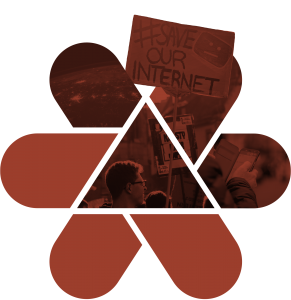The #KeepItOn campaign and coalition, hosted by Access Now, unites and organises efforts to end internet shutdowns worldwide.
Download case study
Members of the #KeepItOn coalition work together to identify, verify and document incidents of internet shutdowns in order to raise awareness of how they violate human rights. The coalition also works to prevent their occurrence through advocacy, capacity-building and litigation. Uniting under the banner of #KeepItOn and now with 220 members worldwide, they have successfully fought internet shutdowns in several national contexts, while raising the profile of the issue at the international level.
Coordinating a holistic response
It is a challenge to ensure that the right resources are in the hands of the right partners in the right place at the right time. Contexts where shutdowns are most prevalent are also settings where civic space is narrower, or closed. Thus, there are fewer civil society organisations operating there who are able to work with a global coalition, or who have the skills needed for a holistic response (policy expertise for understanding the political context and technical expertise for running tests and identifying how the shutdown is implemented). Coordinating these moving parts is challenging – the grassroots grants programme is aimed at developing this infrastructure through capacity-building, in order to mitigate this ongoing challenge.
Be prepared
Coalition members have learned from different contexts to be proactive rather than reactive. Now, rather than waiting for a shutdown to happen and then responding, they try to anticipate the challenges that may arise, for example around upcoming elections, and create strategies depending on the risks that are foreseeable.
Inclusivity
The decentralised model has been key to the coalition’s success. Although Access Now is an international organisation, many of its team members don’t have first-hand experience of internet shutdowns. It is vital therefore that those with direct experience of blackouts and restrictions are able to speak for themselves. Access Now has provided guidance and resources and initiated the development of the coalition, with the aim of being inclusive and raising up the true diversity of experiences. More support is needed from ICSOs to support those communities on the ground who are most affected by restrictions.
High-level figures and international and regional bodies have denounced internet shutdowns as a result of the coalition’s advocacy efforts, for example:
- In 2016 the UN passed the resolution on the Promotion, protection and enjoyment of human rights on the internet, condemning internet shutdowns, and urging states to refrain from ordering such measures. This was further maintained in 2018. Meanwhile, the African Commission on Human and People’s Rights passed a resolution in 2016 condemning the use of shutdowns by state parties during elections and protests.
- In 2017, 30 governments coordinated by the Freedom Online Coalition declared their commitment to fight internet shutdowns, in a statement issued at Access Now’s RightsCon meeting in Brussels.
- The UN High Commissioner for Human Rights and Special Rapporteurs have condemned internet shutdowns, and have cited data collected by the coalition in their annual reports to UN bodies. Such reports include the 2019 Human Rights Council Report on Freedom of peaceful assembly and association in the digital age, and the 2020 Human Rights Council Report on Disease pandemics and freedom of opinion and expression.
- Recent litigation wins against internet shutdowns have been recorded in Togo and Indonesia.
This has created important international and regional support and accountability, and is an important step in ensuring that shutdowns do not become the new normal.